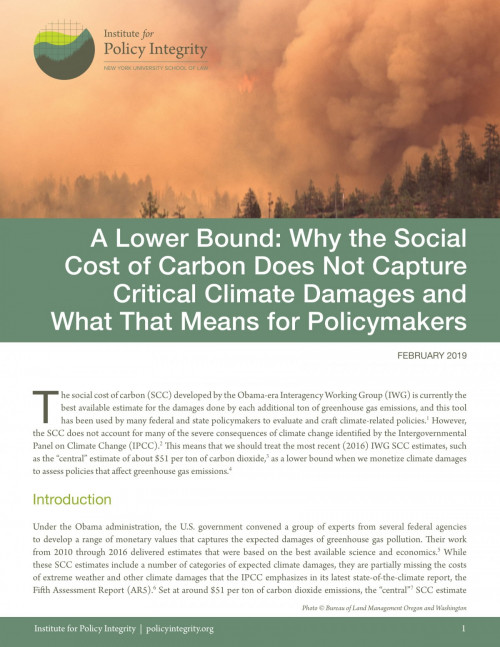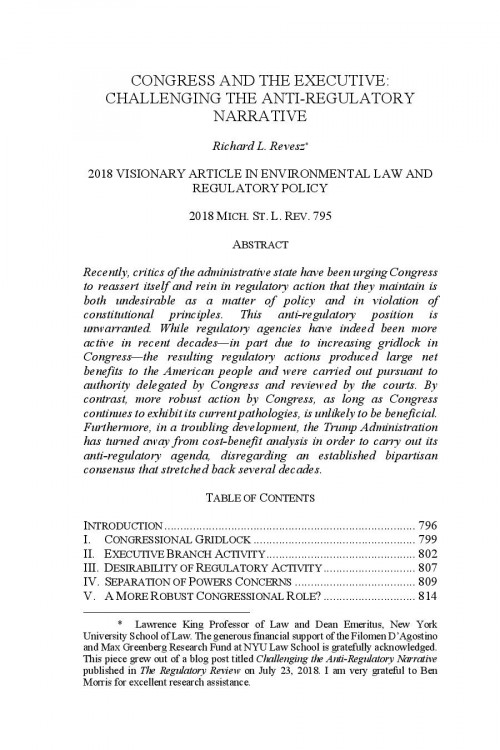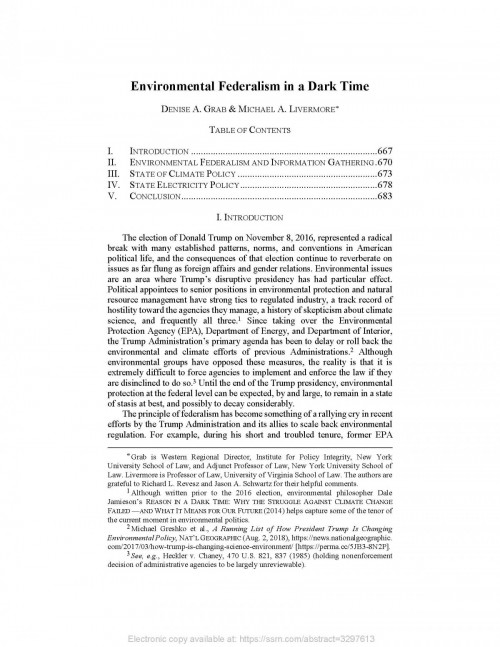-

A Lower Bound
Why the Social Cost of Carbon Does Not Capture Critical Climate Damages and What That Means for Policymakers
The Social Cost of Carbon, developed by the Obama-era Interagency Working Group (IWG), is the best available tool for measuring the economic damages from greenhouse gas emissions. It has been used in analysis for over 100 federal regulations that affect greenhouse gas emissions, as well as by a number of states in electricity and climate policy. Still, many significant impacts identified by the Intergovernmental Panel on Climate Change are difficult to quantify and so have been omitted from the IWG SCC estimates. Impacts such as increased fire risk, slower economic growth, and large-scale migration are all unaccounted for, despite their potential to cause large economic losses. Our new issue brief discusses these omissions and other variables that will influence climate outcomes. We encourage policymakers to account for this likely underestimate by viewing the SCC as a lower bound for damages.
-

Congress and the Executive
Challenging the Anti-Regulatory Narrative
Critics of the administrative state have been urging Congress to rein in regulatory action, claiming that regulations created by executive agencies are undesirable as a matter of policy and are in violation of constitutional principles. In a troubling development, the Trump Administration has also turned away from cost-benefit analysis in order to carry out its anti-regulatory agenda, disregarding an established bipartisan consensus that stretched back several decades. This article, published in the Michigan State Law Review, argues that this anti-regulatory position is unwarranted. These executive regulatory actions produced large net benefits to the American people, were carried out pursuant to authority delegated by Congress, and were reviewed by the courts. By contrast, more robust action by Congress, as long as Congress continues to exhibit its current gridlock on important policy issues like climate change, is unlikely to be beneficial.
-
Comments to EPA on Delay of Landfill Emission Guidelines
In 2016, EPA finalized Emission Guidelines and Compliance Times for Municipal Solid Waste Landfills. Once implemented, the regulation will deliver significant net benefits from reducing pollution that contributes to climate change and other harmful impacts to human health. EPA, however, is proposing to substantially delay the implementation of these protections. We submitted comments that point out how EPA fails to justify the proposed delay and assess its social costs.
-
Poisonous Skies
Acid Rain and the Globalization of Pollution
Grounded in archival research spanning eight countries and five languages, as well as interviews with leading scientists from both government and industry, Poisonous Skies is the first book to examine the history of acid rain in an international context. By delving deep into our environmental past, Rothschild hopes to inform its future, showing us how much is at stake for the natural world as well as what we risk—and have already risked—by not acting.
-
Amicus Brief on Climate Impacts of the PennEast Pipeline Project
In January, the Federal Energy Regulatory Commission (FERC) authorized the construction and operation of the PennEast Pipeline Project, a 116-mile natural gas pipeline between Pennsylvania and New Jersey and associated facilities. FERC’s Environmental Impact Statement (EIS) showed that the project will result in an increase in greenhouse gas emissions but did little more than quantify those emissions, failing to fully analyze and consider the climate impacts of the project. We submitted an amicus brief to the U.S. Court of Appeals for the District of Columbia Circuit that demonstrates how FERC could have used the Social Cost of Carbon to analyze the pipeline’s climate impacts.
-
Comments to BLM on Resource Management in the Powder River Basin
The Bureau of Land Management (BLM) is considering amending Resource Management Plans for the Miles City and Buffalo field offices in the Powder River Basin. The agency will prepare an environmental impact statement (EIS) for the proposal. We submitted comments at the scoping phase urging BLM to provide analysis that quantifies the external costs of fossil fuel development in the region and evaluates critical land management alternatives.
-
Comments to BLM on Foidel Creek Mine Expansion
A proposed expansion of the Foidel Creek Mine in Colorado would allow Peabody Energy to recover nearly five million additional tons of federal coal, extending the mine’s life by an additional two years. We submitted joint comments that critique the Bureau of Land Management’s (BLM) environmental assessment of the expansion, which miscalculates downstream emissions and fails to monetize the climate damages those emissions will produce.
-
Supplemental Comments to NHTSA and EPA on Vehicle Emissions Standards
In October, we submitted comments to the National Highway Traffic Safety Administration (NHTSA) and Environmental Protection Agency (EPA) critiquing the proposed Safer Affordable Fuel-Efficient Vehicles Rule. We now have also submitted supplemental comments rebutting an analysis, prepared by NERA Economic Consulting and Trinity Consultants and submitted by the Alliance of Automobile Manufacturers, in support of the proposed rule.
-

Environmental Federalism in a Dark Time
The principle of federalism has become something of a rallying cry in recent efforts by the Trump Administration and its allies to scale back environmental regulation. For example, during his short and troubled tenure, former EPA Administrator Scott Pruitt argued that the federal government has become too intrusive and that states should be returned to a position of “regulatory primacy” on environmental matters. Some states have responded to the impeding federal retreat by forging ahead. For example, California has continued to take aggressive steps to curb greenhouse gas emissions, and has even taken steps to project its influence internationally. However, despite these hopeful signs of resistance, the net effect of the Trump Administration’s efforts to scale back federal environmental policy is likely to undermine rather than energize state environmental policymaking, especially in Republican-dominated and swing states, where the climate policy vacuum is most acute.
-
Comments to EPA on Reconsideration of Methane Standards for New Sources
In 2016, EPA finalized a set of performance standards for new, reconstructed, and modified sources of methane and volatile organic compounds (VOCs) in the oil and natural gas sector. A recent proposal, however, aims to weaken the 2016 rule in a variety of ways, with the goal of reducing the regulatory “burden” on industry. We submitted comments that focus on inadequacies in the cost-benefit analysis accompanying the proposed rule.



